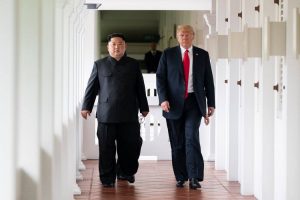SINGAPORE — The Singapore Summit between U.S. President Donald Trump and North Korean leader Kim Jong Un has concluded. It has been a remarkable day of images and soundbites. It has also been a day filled with equal measures of subtleties and substance.
The United States and North Korea have signed a joint statement that includes commitments to pursue new relations between the two countries, to “build a lasting and stable peace regime on the Korean Peninsula,” to work toward “complete denuclearization” of the Peninsula, and to “recovering” and “repatriating” POW/MIA remains. Denuclearization is rewarded by U.S. “security guarantees.”
As meaningful as the joint statement is, however, statements made by Kim Jong Un resonate just as deeply. At the beginning of the summit, as Kim and Trump sat down after the handshake but before their 45-minute one-on-one, Kim said, “For us, the past has been holding us back, and old practices and prejudices have been covering our eyes and ears, but we have been able to overcome everything to arrive here today.”
That’s a difficult admission for a leader of any country to make. Kim seemed to make it effortlessly. He was not reading from notes. It’s astonishing in that it admits to flaws in past approaches, the kind of admission that cult-of-personality leaders of single-party, communist countries never make. It is even more meaningful in that it reveals Kim’s seeming willingness to depart from the legacy of his father and grandfather, making it a personal as well as a political choice.
Later, after the joint signing, Kim said that “the world will see a major change.” Again, this was a statement that Kim did not need to make if he did not mean it.
Almost as remarkable as the summit itself was the press conference that Trump gave later in the afternoon, after Kim had left, to the gathered international press corps at the Capella Hotel. For over an hour, the president single-handedly managed the event, choosing each journalist in turn, while team members such as Secretary of State Mike Pompeo and Press Secretary Sarah Huckabee Sanders sat in the audience. Trump, who mentioned that he hadn’t slept in 25 hours, seemed relaxed and comfortable, and was even humorous at times, despite facing some tough questions. The press, for their part, were generally respectful and professional, many offering him congratulations. At the end of press conference, the press corps, amazingly, broke into spontaneous applause for the president.
The president was asked if he had betrayed Otto Warmbier by meeting with the leader of the country which is responsible for his death. Trump said that in fact, if it hadn’t been for Warmbier, “this might not have happened.” The young American, he continued, “didn’t die in vain.” What happened to Warmbier had a huge impact on all sides, including on North Korea.
Trump was also asked if had betrayed the 100,000 people in North Korean gulags. “No,” he replied, “I think I’ve helped them.” Things will be changing in North Korea, Trump added.
Affirming that sanctions will stay in place until the North Korean nuclear capability is gone, Trump also answered several questions about the omission of the words “verifiable” and “irreversible” from the signed joint statement. Throughout his answers on this point, Trump stated that “complete denuclearization,” which is in the statement, puts the process on a track that includes the verifiability and irreversibility of the process.
With respect to an eventual peace treaty, Trump said that China will be included in those talks, and both China and South Korea should be signatories to any peace treaty between the two Koreas.
Not in the written but in last-minute verbal agreements made during the summit is a commitment by North Korea to the destruction of a major missile engine testing site. Also not in the signed statement is a commitment by Trump that there will be no more joint military exercises with South Korea, what “I call war games,” for the time being. Characterizing the exercises as needlessly provocative, Trump also indicated that he will be glad to reap the savings from what is an expensive operation.
On human rights, the president said that the subject had been discussed with Kim, and “quite strongly,” adding that he believes that there are going to be changes on that front.
Asked about the remains of POWs and MIAs from the Korean War, Trump said that “bringing back the remains was not something we even had on our agenda, we brought it up at the end. And Kim immediately agreed. You know, they know where the remains are; often they are buried along roadsides.” Trump said that he had been asked by many affected families to pursue this with Kim.
Trump said that “Chairman Kim has an opportunity to be remembered as a leader like no other.” But he also said that “today is the beginning of an arduous process. Our eyes are wide open.”

































